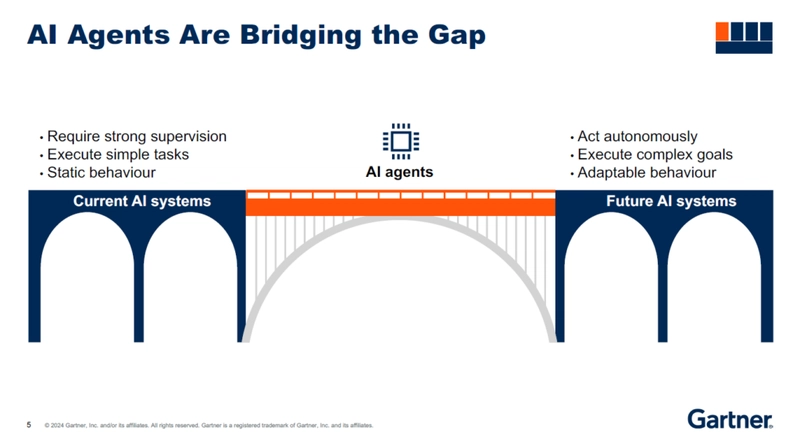The AI landscape is evolving rapidly, and as we move through 2025, one of the most transformative trends is the rise of AI agents. Unlike traditional AI systems that simply respond to prompts, AI agents can act autonomously, make decisions, and complete complex tasks with minimal human intervention. This represents a fundamental shift in how we interact with AI technology.
But what exactly are AI agents, and how are they different from the AI tools we've been using for the past few years? In this post, we'll explore the exciting world of AI agents, their capabilities, and their potential impact on various industries.
What Are AI Agents?
AI agents are autonomous or semi-autonomous AI systems designed to perform specific tasks or achieve certain goals. Unlike traditional AI systems that simply process information and generate responses, agents can:
- Take initiative and act without explicit human commands
- Use tools and interact with other systems
- Make decisions based on goals and constraints
- Learn from past interactions to improve performance
- Maintain context and memory across sessions
As IBM describes them, "2025's agents will be fully autonomous AI programs that can scope out a project and complete it with all the necessary tools they need and with no help from human partners." IBM
The Evolution from Chatbots to Agents
The journey from basic chatbots to sophisticated AI agents has been remarkable:
- First-generation chatbots (2016-2020): Rule-based systems with limited capabilities
- LLM-powered assistants (2021-2023): Systems like ChatGPT that could understand and generate human-like text
- Tool-using AI (2023-2024): AI systems that could use specific tools to accomplish tasks
- AI agents (2025): Autonomous systems that can plan, decide, and take action to accomplish complex goals
Key Components of Modern AI Agents
1. Planning and Reasoning
Modern AI agents don't just respond to immediate instructions—they can break down complex goals into manageable steps. This ability to plan and reason allows them to tackle multifaceted problems that would have been impossible for earlier AI systems.
2. Tool Use and Integration
One of the most powerful aspects of AI agents is their ability to use external tools. Whether it's searching the web, analyzing data, or interacting with other software, agents can leverage the right tools at the right time to accomplish their objectives.
3. Memory and Context Awareness
Unlike traditional AI systems that might forget the context of a conversation, modern agents maintain sophisticated memory systems. This allows them to learn from past interactions and maintain continuity across sessions.
4. Multi-agent Collaboration
Perhaps the most exciting development in the agent space is the emergence of multi-agent systems. These are collections of specialized AI agents that can work together, similar to how a team of humans might collaborate on a project.
As noted by Sequoia Capital, "While AI agents dominated the conversation in 2024, 'swarms' or networks of AI agents working together will be the next big development in 2025." Forbes
Real-World Applications of AI Agents in 2025
Business Automation
AI agents are revolutionizing business operations by automating complex workflows. From managing customer support to orchestrating marketing campaigns, these agents can handle multifaceted business processes with minimal human oversight.
Personal Productivity
Personal AI agents are helping individuals manage their daily lives by scheduling appointments, organizing information, and even making recommendations based on personal preferences and past behavior.
Healthcare
In healthcare, specialized agents are assisting with everything from patient triage to treatment planning. These systems can analyze medical data, keep up with the latest research, and provide decision support to healthcare providers.
Creative Industries
Content creators are using AI agents to streamline their workflows. These agents can research topics, draft content, source images, and even help with editing—all while maintaining the creator's unique voice and style.
Ethical Considerations and Challenges
While AI agents offer tremendous benefits, they also raise important ethical questions:
- Autonomy and control: How much decision-making power should we delegate to AI systems?
- Transparency: Can we understand how agents make decisions?
- Reliability: How do we ensure agents act reliably in critical situations?
- Accountability: Who is responsible when an agent makes a mistake?
As Sam Altman, CEO of OpenAI, noted in a recent TED talk, "The AI revolution is here to stay... ensuring these systems align with human values and intentions remains our greatest challenge." TED
Getting Started with AI Agents
If you're interested in experimenting with AI agents, here are some resources to get you started:
- LangChain: A popular framework for building applications with LLMs
- AutoGPT: An experimental open-source project that aims to make GPT-4 fully autonomous
- BabyAGI: A simple task management system built around the concept of AI agents
- Microsoft's Copilot Studio: A platform for building and deploying enterprise-grade AI agents
Conclusion
AI agents represent the next frontier in artificial intelligence. By combining language understanding, reasoning capabilities, tool use, and autonomy, these systems are pushing the boundaries of what's possible with AI.
As we move through 2025, we can expect to see AI agents become increasingly integrated into our daily lives and work. The organizations and individuals who understand and embrace this technology will be well-positioned to benefit from the tremendous opportunities it presents.
What are your thoughts on AI agents? Have you experimented with any agent-based systems? Share your experiences in the comments below!
This post is part of a series on emerging AI trends in 2025. Stay tuned for more insights on multimodal AI, reasoning capabilities, and small language models.






Top comments (0)